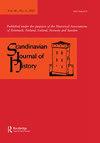The Earldom of Orkney, the Duchy of Schleswig and the Kalmar Union in 1434
IF 0.8
3区 历史学
Q1 HISTORY
引用次数: 0
Abstract
ABSTRACT In August 1434, Erik VII, king of Denmark, Norway and Sweden, confirmed William Sinclair as earl of Orkney, thus ending a decade-long dispute over the hereditary nature of that island fief. Although surviving sources pertaining to Orkney tell us little about Erik VII’s motives, historians have traditionally pointed to circumstances in and around the isles to explain the king’s acknowledgement of William’s claims. In this article, it is argued that the events must be interpreted in light of a concurrent dispute over counts of Holstein’s hereditary claims to the duchy of Schleswig, which were vigorously denied by Erik VII. It can be concluded that the latter dispute influenced the debate over Orkney by making the hereditary enfeoffment of William Sinclair a strategic impossibility for Erik VII, who could not acknowledge one claim without opening the door for another. The king’s acquiescence of William’s claim in 1434, we contend, reflected changing conditions in Schleswig, where the king was forced to recognize the counts’ hereditary rights. The contribution offers a new take on Orkney’s late-medieval development and encourages that island principality’s inclusion in pan-Scandinavian events.1434年的奥克尼伯爵领地、石勒苏益格公国和卡尔马联盟
摘要1434年8月,丹麦、挪威和瑞典国王埃里克七世确认威廉·辛克莱为奥克尼伯爵,从而结束了长达十年的关于该岛封地世袭性质的争论。尽管与奥克尼有关的幸存消息来源几乎没有告诉我们埃里克七世的动机,但历史学家传统上会指出群岛内外的情况来解释国王对威廉主张的承认。在这篇文章中,有人认为,必须根据同时发生的关于荷尔斯泰因对石勒苏益格公爵领地的世袭主张的争议来解释这些事件,而埃里克七世极力否认了这些指控。可以得出的结论是,后一场争端影响了关于奥克尼的辩论,使威廉·辛克莱的世袭分封对埃里克七世来说在战略上是不可能的,因为他不能承认一种主张而不为另一种主张打开大门。我们认为,国王在1434年默许威廉的主张,反映了石勒苏益格不断变化的情况,国王被迫承认伯爵的世袭权利。这一贡献为奥克尼中世纪晚期的发展提供了新的视角,并鼓励该岛公国参与泛斯堪的纳维亚活动。
本文章由计算机程序翻译,如有差异,请以英文原文为准。
求助全文
约1分钟内获得全文
求助全文
来源期刊

SCANDINAVIAN JOURNAL OF HISTORY
HISTORY-
CiteScore
1.10
自引率
20.00%
发文量
33
期刊介绍:
Scandinavian Journal of History presents articles on Scandinavian history and review essays surveying themes in recent Scandinavian historical research. It concentrates on perspectives of national historical particularities and important long-term and short-term developments. The editorial policy gives particular priority to Scandinavian topics and to efforts of placing Scandinavian developments into a larger context. Studies explicitly comparing Scandinavian processes and phenomena to those in other parts of the world are therefore regarded as particularly important. In addition to publishing articles and review essays, the journal includes short book reviews. Review essay proposals and polemical communications are welcomed.
 求助内容:
求助内容: 应助结果提醒方式:
应助结果提醒方式:


